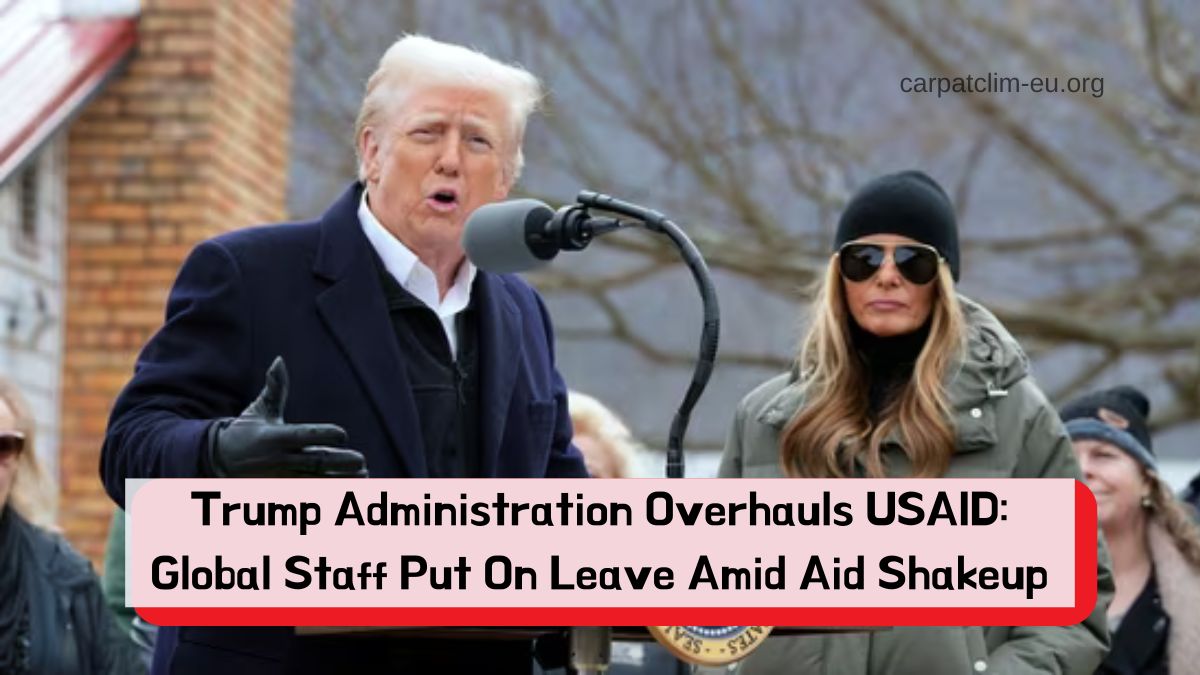Latest News
Trump Administration Overhauls USAID: Global Staff Put On Leave Amid Aid Shakeup

In a sweeping move, the Trump administration has placed all direct-hire employees of the U.S. Agency for International Development (USAID) on administrative leave globally, effective February 7, 2025, at 11:59 pm EST.
This decision is part of a significant restructuring of U.S. foreign aid operations.
Background of the Overhaul
The restructuring follows an executive order issued by President Donald Trump on January 20, 2025, which initiated a 90-day pause on all U.S. foreign development assistance programs to conduct a comprehensive review.
Subsequently, the State Department suspended most existing foreign aid programs, with limited exceptions for emergency food assistance and military aid to key allies.
Elon Musk, leading the Department of Government Efficiency (DOGE), has been instrumental in this initiative, advocating for significant reductions in government spending and increased operational efficiency.
Musk has been openly critical of USAID, labeling it as a “criminal organization” and asserting that it is “beyond repair.”
Key Details of the USAID Overhaul
| Aspect | Details |
|---|---|
| Effective Date | February 7, 2025, at 11:59 pm EST |
| Personnel Affected | All direct-hire USAID employees worldwide, with exceptions for mission-critical functions and core leadership |
| Recall Plan | Overseas personnel to return to the U.S. within 30 days; return travel expenses covered by the agency |
| Leadership Changes | Secretary of State Marco Rubio appointed as acting head of USAID |
| Agency Status | Plans to merge USAID into the State Department, effectively dismantling its independent status |
Implications of the Restructuring
The decision to place USAID staff on leave and recall overseas personnel has far-reaching implications:
- Program Disruptions: The suspension of USAID operations has led to the halting of numerous global aid programs, including health initiatives, disaster relief, and development projects. This sudden cessation has left many implementing partners in financial distress, with some forced to lay off staff and others facing unpaid invoices.
- Humanitarian Concerns: Critics argue that the abrupt withdrawal of aid could have dire consequences for vulnerable populations worldwide. Essential services such as food distribution, healthcare, and clean water provision are at risk, potentially leading to increased suffering and instability in affected regions.
- Legal and Political Challenges: The legality of dismantling USAID without congressional approval is under scrutiny. Established by Congress as an independent agency, any significant changes to its structure or existence may require legislative authorization. This move has sparked debates about executive authority and the proper channels for implementing such substantial policy shifts.
The Trump administration’s decision to place USAID staff on leave and recall overseas personnel marks a pivotal shift in U.S. foreign aid policy.
While proponents argue that the overhaul is necessary for increased efficiency and fiscal responsibility, critics warn of the potential negative impacts on global humanitarian efforts and the legal complexities involved.
As the situation unfolds, the international community and aid recipients alike await further developments and clarifications regarding the future of U.S. foreign assistance.
FAQs
What is the reason behind placing USAID staff on leave?
The Trump administration aims to restructure U.S. foreign aid operations, with plans to merge USAID into the State Department to enhance efficiency and reduce government spending.
Will any USAID programs continue during this transition?
While most programs are suspended, exceptions have been made for mission-critical functions and certain humanitarian aid initiatives. However, many projects are currently halted, pending further review.
How will this affect ongoing international aid projects?
The suspension has led to significant disruptions in various aid programs worldwide, affecting services such as healthcare, disaster relief, and development projects. Implementing partners are facing financial challenges, and the long-term impact remains uncertain.
-

 Social Security2 days ago
Social Security2 days agoWho Will Qualify The $2000 Social Security Payment, February 12?
-

 US Coins2 days ago
US Coins2 days ago3-Cent Silver Coins (1851-1873)- A Small Coin with a Rich History
-

 Social Security2 days ago
Social Security2 days agoWho is Eligible for the $484 SSI Benefit in February 2025? Payment Details Inside
-

 Social Security2 days ago
Social Security2 days agoIndividuals at Risk of Losing Social Security Benefits in February
-

 Latest News2 days ago
Latest News2 days agoTrump’s Plan To Turn Gaza Into The ‘Riviera Of The Middle East’
-

 Latest News1 day ago
Latest News1 day agoDOGE Team Uncovers Potential Fraud In Medicare And Medicaid Systems
-

 Latest News3 days ago
Latest News3 days agoNew Social Security Law Enhances Benefits For 3.2 Million Retirees But Brings Implementation Delays
-

 Latest News1 day ago
Latest News1 day agoTrump’s Gaza Takeover Proposal: Aides Defend Plan Amid Global Backlash And Walkbacks












